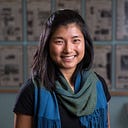The man in the coffee shop beckoned to ask me a favor.
“Hey, I’m going to step outside for a moment. Could you help keep an eye on my phone?”
I was posted at the Starbucks in Astor Place a few days ago, working on a fact-check assignment. “Sure,” I say with a smile.
“Are you Filipino, by the way?”
I answer wordlessly with a subconscious scowl, but he seemed to have heard my internal dialogue.
“You seem offended.”
“I’m not offended,” I explain. “I’ve heard questions like that my entire life, and I find it very assumptive. For instance, what if I asked you” — the man was black — “ ‘Are you from Kenya?’”
“Well, I wouldn’t be offended if you said that, but my family is actually from Jamaica,” he replied.
We go back and forth. I explain to him that by asking someone if they’re from a specific place, you’re making assumptions about where they come from and how that could tie into their identity. He explains to me that he didn’t mean to offend me and thinks Filipino women are exceptionally beautiful.
Eventually, I thank him for explaining his intent. Later on, as I was gathering my belongings on my way out, he apologized if he offended me in any way.
As I’ve learned from living and traveling in and around Southeast Asia, my ethnically ambiguous looks have been both a blessing and a curse.
It has allowed me to blend in seamlessly on the bustling streets of Bangkok. Wherever I went, people treated me as a native — as long as I didn’t open my mouth or look so obviously out of place. Whereas tuk-tuk drivers in Phnom Penh kept approaching my very-white travel partner, they left me alone.
But taxi drivers have looked at me curiously when I enter and give my destination with a wretched Thai accent. Minutes into the ride, I am invariably asked where I am from.
“America,” I tell them.
“Ah, but” — and then they point to their skin.
“My parents are Chinese.”
In Cambodia, I learned that if you are Cambodian or have family who live in Cambodia, you don’t have to pay the entrance fare at Angkor Wat. When I walked up to the ticket booth, the women looked at me curiously and asked, “are you Cambodian?”
“No, I have a US passport.”
“Are your parents Cambodian?”
“No.”
“Do you have any family in Cambodia?”
I smiled, said no, and handed them $20.
In Myanmar, I picked up the phrase “ah ma lay!” from my AirBnB hosts, a handful of expats, some of whom were recently posted to Yangon for work. It was one of their favorite Burmese phrases meaning, “oh my god.” I loved the exasperation that the phrase conveyed, and found myself using it in rather frustrating moments where I was dealing with cab drivers who were so obviously trying to rip me off, or squeezing through the crowded streets of Yangon. But the Burmese took that as a sign to talk to me in their language — one that I couldn’t actually speak.
During Vipassana, a Polish woman peered at me as if I was an animal in a zoo. For orientation, before noble silence went into effect, the English-speaking students were separated from those who understood Thai. As I took a seat in my designated room, the Polish woman looked at me and said, “You’re not Thai?”
“No,” I say. “I’m Chinese, and grew up in America.”
“But you look Thai,” she countered. “This is very confusing.”
I stared back at her silently. Nope, not that confusing! I wanted to call her out on her ignorance.
On Day 10, after noble silence was lifted, she approached me with another meditator as I was eating my lunch.
The Polish asked the woman she was seeking for a second opinion: “What do you think she is? She isn’t Thai!”
One thing I learned from Vipassana is that I can’t change other people. I couldn’t have changed this woman’s ignorance, but I could change how I reacted to her ignorance.
Soon, in Thailand, I learned that I should just come clean with the fact that I am not actually Thai. Saying hello in Thai (sawatdee kaa) invited further conversation in Thai — one that I did not have the faculties to engage with.
In the US, I’ve been asked by strangers “Where are you from?” And when I say, New York, sometimes the questioner follows up with, “But where are you really from?” This really used to get to me, as if my honest answer wasn’t already satisfactory enough. As if I am lying about where I am from. As if I have to answer with some exotic place because that’s how the other person expects me to answer.
I inevitably got tanner in the last four months — tan enough such that I don’t think people would guess I was Chinese. But during my stay in Southeast Asia, I’ve learned to embrace my ethnic ambiguity. I’ve learned to see that from another person’s perspective, it can be perplexing to experience who looks some type of (Southeast) Asian, speaks English without an accent, but can’t speak the local language at all. So when Thais, Burmese, Cambodians, and Vietnamese have asked me where I’m from, I know it comes from a kind, curious place. I even empathize with the man in the coffee store a little more. I’ve learned that when someone asks me “where are you from?” in a nonjudgmental manner, that curiosity is an antidote to ignorance.
